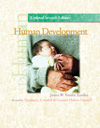 |  Human Development: Updated, 7/e James Vander Zanden,
Ohio State University
Thomas Crandell,
Broome Community College
Corinne Crandell,
Broome Community College
Developmental Theories
Chapter OutlineChapter 1 explored the subject of human development and critiqued several research methods used in the study of various aspects of human development. Chapter 2 provides an in-depth analysis of the five major theoretical perspectives in regard to human development. The chapter presents a detailed discussion of the following:
1Psychoanalytic Theories. These illustrate the importance of early experience in personality development and the role of unconscious motivation. Freud's psychosexual stages, as well as Erikson's psychosocial stages of development, are examined within this context. |
 |  |  | 2Behavioral Theory. This stresses the part that learning plays in inducing individuals to act in the ways that they do. Skinner's basic tenets in regard to this perspective are highlighted. |
 |  |  | 3Humanistic Theory. This emphasizes that people are capable of intervening in the flow of life's experiences to influence and fashion their own beings. Discussion centers on the viewpoints of Maslow and Rogers. |
 |  |  | 4Cognitive Theory. This draws our attention to the importance of various mental capabilities and problem-solving skills that equip people with potent adaptive skills. Piaget's cognitive stages are examined within this context. |
 |  |  | 5Cognitive Learning. This emphasizes the information processing which allows individuals to perform discrete mental operations on incoming information and then store it for later processing. |
 |  |  | 6Ecological Theory. This looks at the interaction between the individual and the environment. Bronfenbrenner adds that development must be understood as the person immersed in a web of social, physical, and cultural spheres. |
 |  |  | 7Socio-Cultural Theory. The view that individual development must be aided by social interactions. |
 |  |  | 8Evolutionary Adaptation Theory. This highlights various biological patterns that ready individuals for specific kinds of behavior. |
 |  |  | 9Controversies. Several important controversies are presented, which increase one's understanding of the distinctions among the major theories of human development. |
|



 2003 McGraw-Hill Higher Education
2003 McGraw-Hill Higher Education